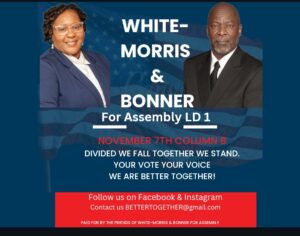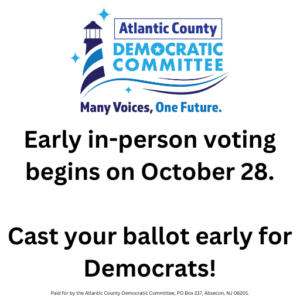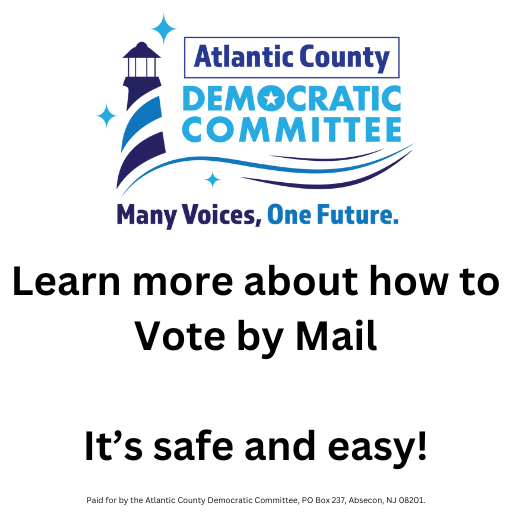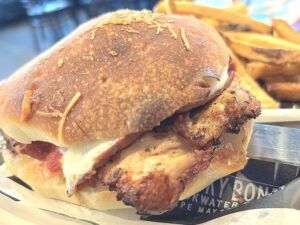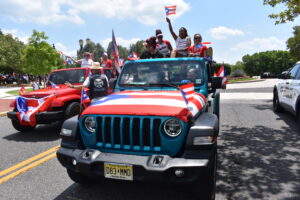Personal Essay: Sade Osuji Looks to Join Exclusive Club as Black Female Commercial Pilot
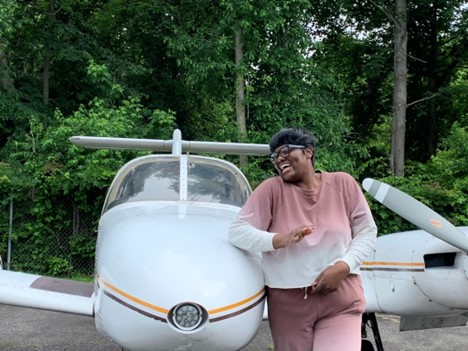
Photo courtesy of Sade Osuji
PERSONAL ESSAY
By Sade Osuji | For AC JosepH Media
My name is Sade Osuji and I am stepping into the cockpit and flying into a world where the number of Black female pilots will count for more than just 1% of the overall female pilot population in the United States.
With a Private Pilot license (PPL), I have taken a major step towards becoming a commercial airline pilot.
As a first-generation pilot, I’ve had to navigate the process with the help of other Black students and professional pilots. With the consistent support and mentorship from local Black-owned flight school, Old Bridge Flight School, and active aviation organizations like Sisters of the Skies and the Organization of Black Aerospace Professionals (OBAP), I have succeeded in becoming a young pilot of a single-engine aircraft.
A Private Pilot Certificate is similar to what a driver’s license is for automobiles. By earning a private pilot license, one can legally fly an aircraft. In order to receive the certification student pilots must:
- Be 17 years of age
- Read, speak, write and understand the English language
- Hold a U.S. student pilot certificate, sport pilot certificate, or recreational pilot certificate
- Receive flight training and a logbook endorsement from an authorized instructor
- Meet the aeronautical experience requirements for the aircraft rating sought
- Pass a knowledge and practical test for the aircraft rating sought.
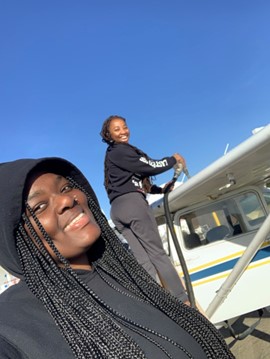
After graduating from Rutgers University in May 2016, I didn’t have a job. My friend and I decided to travel across Europe for two weeks. We went to Paris, Germany, Italy and Spain. On the flight back home from Barcelona to Newark Liberty International Airport, I looked outside of the window, and felt immediate peace.
Peace I never felt before. The clouds were white and fluffy. It felt like Heaven. At that moment I asked myself, ‘why can’t I be a Flight Attendant?” Then took a pause and asked, “Why can’t I be a pilot?”
I’m a Jersey girl. I graduated from Rutgers University with a bachelor’s degree in communication, specializing in Leadership in Organizations and Communities, and Human Resource Management. Aviation was never a thought, I was never exposed to the industry when I was younger.
I hosted a radio show at 90.3 The Core called “She Got The Juice,” managed a campus student center, and became an assistant director of concert and Coffeehouses committee for Rutgers’ Programming Association.
The plan was to go to college and gain as much knowledge and experience in different subjects and industries in the hopes of landing a stable job in any field I wanted.
The moment on the airplane from Spain was a pivotal moment in my life. Within the week I researched black female pilots and ways to become a pilot. Gleim, a publication that distributes a variety of study and reference materials to help people learn and understand aviation, had an article on a Black female student pilot, Tonya Austin.
I saw her number at the end of the article and called. Tonya was so kind and helpful. She recommended I take a Discovery Flight at Old Bridge Flight School, a school she frequently trained at in New Jersey.
A Discovery Flight, also known as an introductory flight, is a short flight alongside a certified flight instructor that gives a person a chance to experience what it’s like to be inside the cockpit and take control of a smaller aircraft. The Discovery Flight is what solidified my decision to move forward with flight training.
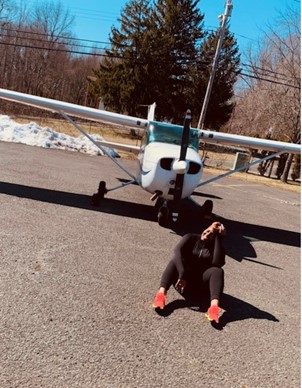
Old Bridge Flight School was a Black-owned flight school in Old Bridge. The owner, Alyson Holt, was the first Black female pilot I’d ever seen in my 26 years of living. She was my first pilot instructor.
Harry Bishop, an Air Force veteran, was her second instructor who guided me all the way to my checkride after Alyson was deployed by the U.S. military. If not for their love and support, I don’t believe I would have completed my pilot training.
According to a Washington Post article, “U.S. Bureau of Labor Statistics, 93% of America’s pilots and flight engineers identify as White, and just over 10% as Black, Hispanic or Asian. Only 5.3% of pilots and flight engineers are women, and of them, less than 1% are Black.”
It took me roughly two years to become a private pilot. I passed the knowledge test with a 98% and my checkride on the first try. A checkride consists of two parts: An oral exam conducted before a student goes flying and an in-flight test where the student demonstrates their skills in the aircraft.
I overexerted myself and was paying out-of-pocket for my training. Working a full-time job from 7 a.m. to 3 p.m., then driving 45 minutes to my flight school right after work, then flying for two hours with my instructor, then driving 45 minutes back home at least three days a week, if weather permitted.
The minimum hours to get my certification was 40. And at the time, I was spending almost $160-$180 an hour for airplane rental and instructor fees. It was hard. Then the 2020 pandemic hit and my instructor was deployed to another country. I had to stop training, which set me back a bit.
I am a pilot because of my support system. I only told my parents and siblings I was pursuing my PPL. At the time my mentor, a Black female captain for American Airlines, Charlene Shortte, encouraged and helped me through it all. She is like my big sister in the skies.
Organizations like Sisters of the Skies, sistersoftheskies.org, an organization of professional Black female pilots who are committed to supporting future Black aviators through mentorship, professional development, outreach and scholarship; and OBAP, a nonprofit organization dedicated to the encouragement and advancement of minorities in all aviation and aerospace careers; were great resources for Black people interested in a career in aviation.
Currently, I am on a break from flying. My goal is and will forever be to become captain for a major airline. Flight training is extremely expensive and in order to train properly, I have to train consistently. So this season is for me to save money and apply for scholarships.
And while I wait I am volunteering my time into my community. I am working with township officials, my church, and other active community organizations to help give people opportunities to flourish.
Right now I am taking a break from flying. The goal is and will always be to become a captain of a major airline, but at the moment flight school is too expensive. I plan to use this year to save and apply for scholarships. While I’m waiting for the funds, I am doing my best to pour my time into my community to make it a better place to live and visit.
I’ve been active in my church, Next Dimension Worship Center, working as an Events Fellow for Willingboro HandS, and writing for South Jersey Information Equity Project. Flying will always be in my heart. And I pray to get back in the cockpit soon.
NOTE: Sade Osuji served as a writer for Front Runner New Jersey earlier this year through the South Information Equity Project where he filed stories out of Burlington County.
Follow Us Today On:
Note from AC JosepH Media: If you like this story and others posted on Front Runner New Jersey.com, lend us a hand so we can keep producing articles like these for New Jersey and the world to see. Click on SUPPORT FRNJ and make a contribution that will go directly in making more stories like this available. Thank you for reading.
